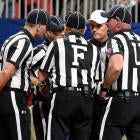DESTIN, Fla. -- The SEC is conducting a comprehensive review of its football officiating. The obvious question: Why is the best conference in college football conducting a comprehensive review of its officiating?
The answer: Why not?
SEC commissioner Greg Sankey said the move to retain international accounting firm Deloitte was more proactive than anything else.
"I did this not because something is broken," Sankey said on Tuesday at the SEC spring meetings. "… But I want us to be better. The sport officiating environment is evolving."
Sankey made a point to distance the SEC's review from that of the Pac-12. That league is involved in a similar review but for different reasons. A series of recent officiating missteps in the Pac-12, along with interference from its general counsel, damaged that league's reputation.
Sankey referenced a 2015 analytics report that he said SEC officials "had the least amount of bias." Discussions about the current review began in September 2018.
That was before two games that season that saw SEC officials' calls make national headlines. The SEC was upset that its officiating crew was criticized on social media in the moments following the seven-overtime game between LSU and Texas A&M.
The game went into overtime after TAMU quarterback Kellen Mond threw the game-tying touchdown pass in the final minute of regulation. That was only after Mond had initially been ruled down, effectively ending the game to the point that LSU coach Ed Orgeron was doused with Gatorade. Texas A&M eventually won 74-72 in the highest-scoring FBS game in history.
SEC officiating supervisor Steve Shaw later defended the officials in that game during a conversation with the Baton Rouge Advocate.
"That interview was a novel approach for us," Sankey said.
The conference also came under criticism earlier last season when LSU star linebacker Devin White was suspended for the Alabama game. There was social media backlash when White was flagged for targeting against Mississippi State QB Nick Fitzgerald. By rule, White was suspended for the next game after being ejected.
The SEC quickly released a statement confirming that the call was correct. The next week, al.com contacted a former SEC official who said there wasn't enough evidence in the replay for him to eject White.
"Perception can be reality," Sankey said. "Part of this communication effort is -- are we going to change everyone's perception? I don't think so, but I think we can make progress."
A curiosity: Deloitte is one of the "Big Four" accounting groups usually associated with company audits and tax planning. It is not known whether the firm has conducted similar reviews for other conferences.
Sankey said the SEC is working with Deloitte's Sports Business Group. The firm will review individual officials' calls as well as those of entire crews for accuracy. Part of the review is to identify trends.
It is known the conference is concerned about the impact of new gambling culture might have on the game's integrity. A year ago, the U.S. Supreme Court ruled that states have the ability to legalize single-game gambling if they so choose.
Currently, one state in the SEC's footprint (Mississippi) allows sports gambling. The NCAA continues to prohibit gambling by its athletes on any sport it sponsors, even if those athletes are of legal age.
Shaw has made clear the specter of gambling. He brings an FBI agent in each year to speak with his officials. Sankey said part of the review would deal with "conflict of interest" issues.
"Integrity is the bottom line of everything," Shaw said last month. "… Gambling is a pervasive thing."
The Associated Press first reported news of the SEC's officiating review on Tuesday afternoon.
















